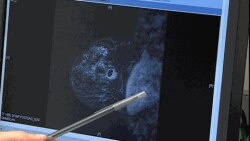“Genes are not destiny” seems to be the message from a new study looking at the relative risk of environmental factors on the development of cancer.
In fact, says Yusuf Hannun, who heads the Stony Brook University Cancer Center in New York, bad genes and DNA mutations appear to play a relatively small role in whether someone develops cancer.
More important, he says, are environmental exposures, such as inhaling tobacco smoke and eating red meat.
"Around 70 to 90 percent of cancer incidence appears to be related to external factors,” Hannun said, “whereas only 10 to 30 percent is related to those intrinsic factors I talked about, with mutation rates, et cetera."
Hannun and his colleagues used a number of complex approaches — including computer modeling, population studies and genetic analysis — to arrive at their conclusions, published Wednesday in the journal Nature.
For example, they looked at how stem cells in different parts of the body divide and mutate, noting that a similar number of genetic errors did not lead to cancer in all tissues.
The researchers also investigated how people's risk of cancer changes when they move from one place to another, suggesting a strong role for external factors in the development of cancer.
A study published earlier this year in the journal Science concluded that most cancer was the result of genetic bad luck, but this study arrives at an opposite conclusion.
Hannun, however, does not entirely rule out genetic randomness when it comes to who gets cancer and who doesn't.
"So, there is an element of luck in that,” he said, “but then, there is a larger element of exposures and external factors that increase that risk tremendously. So, what we want to do is identify those and dial it back so that we go back to that very low intrinsic level."




